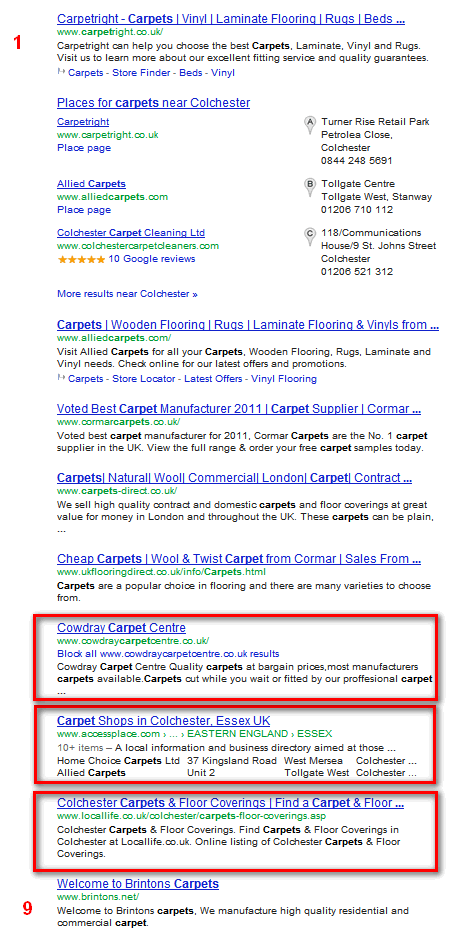
(Image – Simon Doggett, Flickr)
What has happened to cause such a stir in the past week and what exactly is Venice? Essentially, we’ve seen another Google Algorithm update. In itself not a surprise, as there are hundreds of these a year. This time, however, we’ve seen some significant changes to listings that have traditionally been consistently dominated by large established brands and those with big organic search budgets.
Essentially we’re seeing lower ‘weight’, but locally specific pages inserted into the results. These local results are included at town level; county won’t cut it. My location this morning in Colchester is triggering additional organic listings for businesses in Colchester.
With my location set to Colchester, in a non-logged in session (hello incognito mode!)

![]()
Carrying out a search for the broad phrase ‘carpets’
![]()
We are presented with the following results. Note the three local specific listings being ‘artificially’ promoted to positions 6,7 and 8.

I’m not usually one to make a fuss over the smaller updates that Google roll out – they’re mostly in the interest of good, clean search results. This however, has the potential to make some serious impact on the pages that users are presented with in their search results, as well as adjusting the way that some users have to search to find the information they want. It might be worth highlighting that when we hear about ‘named’ algorithm updates (Caffeine, Vince, Panda) they tend to be quite disruptive.
This adjustment is fine for those sites that operate on a local basis, but less so for those that operate nationally or are franchises. Those nation-wide sites are suddenly being listed alongside sites that in some cases are (I’d go as far to label) ‘low quality’ and thin on content, something that Google have clearly warned against in the past.
Most site owners have purposefully avoided building multiple thin ‘service + location’ pages to mop up location specific traffic. Many of those will have earned high profile broad search term rankings through short tail link build and targeting. This update severely impacts those appearing lower down on page one of the search results page; they will be forced on to pages two and further by this newly ‘promoted’ local content.
It is worth adding that the minute you refine with a long tail search, there’s no issue; more specific longer tail terms are less likely to be flagged as phrases that Google applies its ‘local’ rules to.
For a more specific longer tail search, we aren’t shown any location specific results.

Why is Google making this move?
I’ve got a couple of thoughts, aside from the standard ‘improving the search results’ slant that we get from the big G as to some of the reasoning behind the move;
- Is this a way that Google can ‘level’ the search field for broad terms, so that nationwide brands have to up their paid budgets?
- As the Google privacy policy changes and the EU cookie directive changes come into place, more people will use the web logged out and with cookie blocking in place. With advice in the mainstream media around removing search histories and preventing site providers from learning browsing habits by blocking cookies, it is more and more important to Google that non-logged in users are shown relevant results for fear of those users defecting to other search platforms. To counter this, location is one of the factors that Google can, in some cases, take into account for users as they browse.
How does Google decide which content to include as Local results?
From our initial investigation, I suspect that we’re seeing an order of priority of factors in determining ranking of local triggered content in-line with the ‘traditional’ results page entries. It seems that the Places entry is the strongest of all signals we can see;
- Google Places page entry
- Citations (address and phone number in the same format as the places page on other property online)
- Location specific contents of meta title and description
- Link based anchor text (I’m looking into direct evidence of this at the moment)
In the coming days, we’ll be carrying out some testing into these factors to learn if those assumptions are correct and what strategy will have the best impact on sites being optimised.
What does it mean for the industry?
It is important to consider what these latest changes to the results pages might impact in the medium and long term;
- Firstly, in many cases, we’re going to have to push more towards paid search – it certainly feels as though Google’s movements in the past couple of years has seen a shift towards an increasing reliance on paid search for anything but unique brand search terms.
- Will we see the rise of more sites with a page per location – ‘Carpets in Colchester’, ‘Carpets in Brentwood’ and so on. Will Google be wise to that and we’ll see people having to put entire sites up with individual domains for each target location? I suspect we’ll see people trying whatever techniques they can to snatch up previously impossible rankings.
- We’ll see users more likely to use location searches and modifiers; even for things they previously thought were broad. As such, major business centres will see uplifted searches for ‘location+search term’ – i.e. London carpets. As a result, B2B industries will we see a shift towards people including lots of ‘London’ terms.
- Local sites will see increased traffic from broad terms that they were previously unable to rank for from the local area.
- Perhaps we’ll see automatic adjustments over time as people return to the SERPS to refine searches that local results don’t satisfy and Google learns which terms are best suited to those ‘local’ entries and which aren’t. Could it be that the searches with map listings alongside are used as the signal for Google to trigger these new results? A well used set of local results would indicate a strong candidate for a local listing to be included in the search results.
- National sites will see reduced traffic from increased competition to rank for broad terms,
- More reliance on long tail for those national sites.
- Also, rank checking tools could be quite heavily impacted. Are these results consistent across the country on a town by town basis? Using tricks like the &pws=0 variable on the search URL might work for the time being. (I’ve seen reports this week that this is the case).
To the floor: What questions does it raise for SEOs?
Thinking about how SEOs will react to the update, a search for a broad phrase with the new local results in, I’m currently seeing three local specific results. Are these positions ‘fixed’ across the country (i.e. three local entries included by default in fixed positions), or are those dynamically ranked with regular content on relevance by location?
Can a page that’s inserted into the results on local merit appear as one of the locally inserted pages in another location, or can it belong to just the one ‘location’ group?
The big question for SEO’s is can we get our national clients to be included as one of those local listings? what are the options for local specific content?
- Separate domains per location
- Sub domains per location
- Individual pages per location (!)
- Regional pages targeted to a handful of locations
- National pages targeted to many locations
Is the signal just a location in the title and description? It looks like it from where we’re initially looking. How much impact will link build have? Can we simply use anchor text to demonstrate location?
What are the implications if Google gets location wrong?
In the future, how will mentions and endorsement from Social profiles which are being mined for location data affect these search results? I mentioned this post on Twitter and @oli replied;
@J_Fairweather Interested to know if local ratings/reviews has more of an impact on ranking now. I’d also love them to aggregate 4sq/FB…
— Oli Watts (@oli) March 2, 2012
We’re going to be digging through lots of our Analytics data in the coming days to see if there is anything significant to be unearthed for searches that we’re seeing local results included, as well as running some more hands-on tests to see which factors we can use to influence the inclusion of those results. Let us know how you’re seeing these changes affect your searches.
